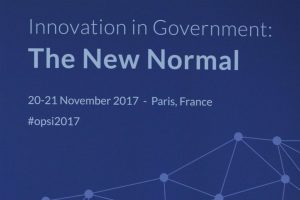
Every day, civil servants in countries around the world are trialling new approaches, experimenting with new ideas and using new tools to address the complex policy challenges they face. All of this activity is focused on delivering better for the citizens they serve.
At the end of last year I had the privilege of joining over 500 of them, from 60 countries, at the OECD to share experiences on ‘Innovation in Government’ or, as the conference was subtitled, ‘The New Normal’. I’ve written previously about the huge value that we can gain from collaborating with and learning from other civil services around the world. To me this is particularly true when thinking about how innovative approaches can best support our work.
It is probably fair to say that the UK has long been seen as one of the leading countries in this area; pioneering work in behavioural insights, Government Digital Service (GDS), What Works, social investment and new commercial models, among others. More recently, a call for innovations by the OECD in summer 2017, many of which featured at this conference, resulted in more examples being submitted from the UK than any other country. The UK submissions covered a diverse range of policy and practice, including, to mention just a few: reproducible analytical pipelines, the 100,000 Genomes project, the digital marketplace, the Model Hospital, CivTEch, the Data Science campus and Predictiv, which was named as a semi-finalist at the conference.
 This diversity was also reflected at the conference itself, where there was strong UK representation. Policy Lab gave a talk about their work and participated in a panel session about innovation labs; GDS ran a workshop on designing user-centred services; and the Financial Conduct Authority (FCA) and the Behavioural Insights Team participated in a panel session about the increasing use of behavioural science in government. The FCA also spoke about their work on using artificial intelligence (AI) in financial regulation investigation.
This diversity was also reflected at the conference itself, where there was strong UK representation. Policy Lab gave a talk about their work and participated in a panel session about innovation labs; GDS ran a workshop on designing user-centred services; and the Financial Conduct Authority (FCA) and the Behavioural Insights Team participated in a panel session about the increasing use of behavioural science in government. The FCA also spoke about their work on using artificial intelligence (AI) in financial regulation investigation.
I had the opportunity to chair a session on the Future of Government, where the discussion ranged from the threats and opportunities of AI, and the use and abuse of targets, to how governments should handle complexity and what children should be being taught to prepare them for tomorrow.

But as Jeremy Heywood recently tweeted, this is an area where we need to run to stand still. So, while an important part of these events is to share our experiences, it is also exceptionally valuable to be able to understand in more detail the innovations being trialled elsewhere, the lessons learnt and to explore whether there are new ideas we would want to explore further in the UK.
What sort of case studies were highlighted? We heard about:
- the use of data science in France to build a tool that helps citizens to tap into hidden job opportunities;
- a citizen-centred approach to transforming welfare provision at Asker Welfare Lab;
- an integrated approach to support an ageing population in Seoul, South Korea; and
- the setting up of a world-first 'data embassy' by Estonia in Luxembourg.
It’s not just specific innovations that were discussed, the talks and panels at the conference also focused on broader questions:
- how do we ensure our innovation capabilities/capacities are being matched to our most pressing policy challenges;
- how do we best enable innovation to flourish across the whole Civil Service and not just in innovation teams/units/labs;
- what is the ecosystem that needs to be in place for innovation to thrive; and
- how do we create a culture where experimentation is not just encouraged but rewarded and how do we ensure that the Civil Service is an attractive workplace for innovators.
 There is no single correct answer to these questions. However, by hearing what is working and what is not in other countries (including, for example, learning more about Free Agents (requires LinkedIn account) in Canada and Entrepreneurs in the public interest in France), we can also look to adjust and iterate our own approach. Indeed, it is vital that we do so, if we are to make the best use of all the new tools, techniques and approaches now open to us.
There is no single correct answer to these questions. However, by hearing what is working and what is not in other countries (including, for example, learning more about Free Agents (requires LinkedIn account) in Canada and Entrepreneurs in the public interest in France), we can also look to adjust and iterate our own approach. Indeed, it is vital that we do so, if we are to make the best use of all the new tools, techniques and approaches now open to us.
